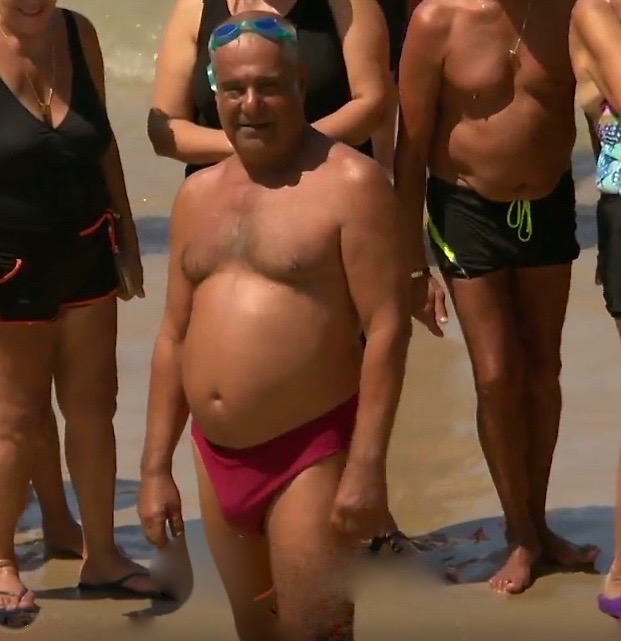Tel Aviv may only be 41.6 miles from Jerusalem, but it’s light-years away in terms of personality and posture. Even within its own city limits, Tel Aviv has nuances not found in other parts of Israel, where it’s far easier to get an immediate pulse on “what lies beneath.”
Being of Sound Body
Tel Aviv, which means “hill of spring,” is a fun city, a party city—a city with fabulous food and fetching physiques that even Conan could not help remark on as part of his hilarious special filmed in Israel. “Well, I’m talking to handsome Israeli #3,652 of the day,” Conan quips. Later, he points to yet another buffed guy and says, “This guy’s jacked … look at how jacked he is.”
It was a sight that repeated itself over and over as I traveled throughout the city. Gyms with names like “Sweat Star Gym” and “Dynamic Jim” are a going concern here—making me painfully aware of my own lack of well-defined muscles. (It does help that at age 18 everyone—male and female—is conscripted into the national army, which makes being of “sound mind and body” of life-saving importance.)
Apparently, this Tel Aviv body consciousness does not extend to middle-aged Israeli men on beaches. In another LOL moment during his Israel special, Conan grabs a loudspeaker, Israeli commando style, and blasts out the directive: “Will all Israeli men in Speedos please leave the area!” The look on one “guilty as charged” Israeli man’s face in response to Conan’s command was priceless!



These Haredim are not Hunks
As for the black-garbed orthodox and ultra-orthodox men (Haredim) who you’ll spy sporadically throughout the city (a lot less than in Jerusalem), well, one can only guess as to the state of their muscles hidden underneath those weighty, 18th-century-style religious garments. (“Regular” orthodox Jewish men don’t wear the long black “dresses” and fur hats.) My understanding is that for the Haredim at least, studying the Torah takes precedence over pumping iron—or pumping into Israel’s economy. That’s because the ultra-orthodox are exempt from military service and shun work to focus on religious studies—segregating themselves from the rest of society.
That being said, there’s been a recent trend of the Haredim’s younger generation joining the military, eschewing their elders beliefs that serving in the IDF (Israel Defense Forces) runs contrary to their being “wholly acceptable” unto Yahweh.

To get somewhat philosophical about this issue …
That explains, in a nutshell, the tension in Israel between the secular and non-orthodox Jews and the Haredim. The former group feels that every Israeli should share the national burden of defending their homeland. This isn’t a religious or political stance, but a purely practical one.
No matter what your opinions are about the whole Israel and Palestinian issue, my take is this: When you’re a tiny country surrounded by enemies on all sides, “discretion is the better part of valor,” and that means preparing yourself, if able-bodied, to fight. Piety is all well and good, but it’s hardly a holy thing to benefit financially from of your fellow citizens’ labor as they risk their lives to keep you safe while isolating yourself in a “holier than thou” bubble. Without casting aspersions on any particular belief system (I’m a person of deep faith myself), self-imposed isolationism always runs the risk of making you seriously deluded. And it certainly doesn’t help cultivate love for your fellow citizens. Some would say that it’s also a convenient way to mask cowardice, a huge impediment to winning people over to your cause or beliefs. But that’s another subject for another time—and a different blog.
From Buildings to Bodies
Departing from the subject of good citizenry and buffed bodies, I’ll move on to buildings. Being a lover of architecture, particularly art deco, mid-century and modernistic design, I was thrilled to find so many buildings in Tel Aviv designed in the Bauhaus style. For the uninformed, Bauhaus was a German art school operational from 1919 to 1933 that combined crafts and the fine arts—later becoming one of the most influential currents in modern design. The Bauhaus had a profound influence upon subsequent developments in art, architecture, graphic design, interior design, industrial design and even typography.
I wish I had snapped more photos of these cool buildings, but my time in Tel Aviv was limited. Next time … in Tel Aviv. (Look for Tel Aviv: Part 2 this week.)

That’s it for now … Part II to be posted on Tuesday.